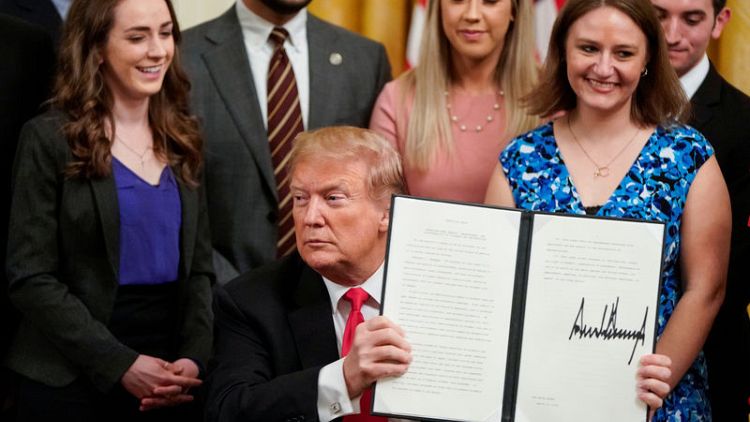WASHINGTON (Reuters) - U.S. President Donald Trump on Thursday signed an executive order linking "free speech" efforts at public universities to federal grants in an effort to combat what he considers a clamp down on conservative students' abilities to share their views.
Under the order, the schools will themselves certify whether they are protecting students' free speech rights, which are already guaranteed by the U.S. Constitution's First Amendment.
The order requires that schools ensure they allow students to express themselves in order to receive funds from 12 federal agencies that help fund universities and colleges.
Trump administration officials have suggested that the rights of speakers on college campuses have been trampled by student protesters, and that conservatives have been unfairly targeted.
Trump, who regularly decries the media as "fake news" and calls defamation laws "a sham," has threatened retaliatory action related to free speech issues where he says the rights of conservatives are under attack.
In signing the order at the White House on Thursday, Trump took the fight to campuses, which receive billions of dollars a year from the federal government, including more than $30 billion (£22.9 billion) for research.
"Universities that want tax dollars should protect free speech, not silence free speech," Trump said.
But the American Association of State Colleges and Universities (AASCU) said in a statement that public schools are already committed to free expression and the executive order "does not — and cannot — add to or subtract from our pre-existing obligations under the Constitution."
A senior U.S. administration official said schools, not the government, would attest to their compliance with the executive order.
Private schools will follow their own policies, and the executive order will not impact student tuition aid programs, the official said.
"The goal of the order is to promote free speech more broadly across college campuses," the official told reporters.
Trump had announced his planned order earlier this month at the annual Conservative Political Action Conference in Washington. The event featured activist Hayden Williams, who was punched at the University of California, Berkeley, in February while recruiting students for a conservative group.
Last year, the Justice Department filed a statement of interest in a free speech lawsuit filed against the university, accusing it of discriminating against speakers with conservative views. The case was settled in December, when the school agreed to modify its handling of "major events" on campus.
Trump's executive order also calls on the Department of Education to make recommendations on financial risk sharing for financial institutions regarding school loans, the official said, but gave no details.
The AASCU said federal aid programs should be addressed through current law via Congress, and "not a unilateral order from the White House."
(Reporting by Susan Heavey)
